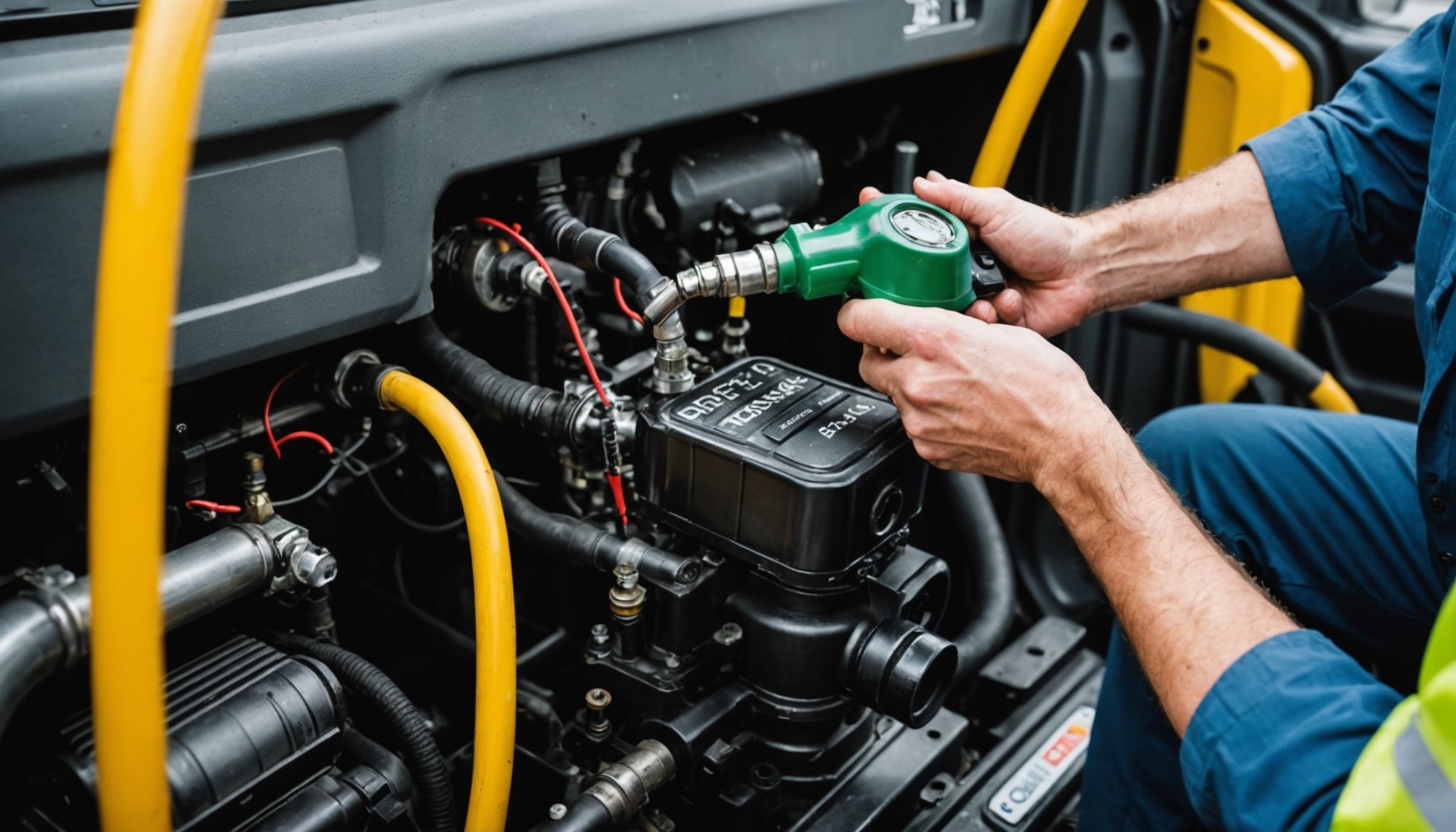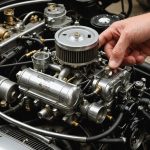Overview of Diesel Truck Injection Systems
Diesel truck injection systems are intricate networks crucial to the operation and efficiency of heavy-duty vehicles. At their core, these systems comprise several components such as fuel injectors, pumps, and control units that determine the precise amount of fuel delivered to the engine at the right time. The fundamental mechanism involves injecting compressed fuel directly into the combustion chamber, a process that maximizes power output while optimizing fuel usage. A well-calibrated injection system enhances both performance and fuel efficiency, a crucial factor given the rising operational costs in today’s economic climate.
In the UK market, efficiency is not just a choice but a necessity due to stringent regulations. The UK government has implemented emissions standards that compel diesel trucks to maintain lower levels of pollutants. These regulations drive innovations in diesel truck injection systems, ensuring that trucks are both environmentally friendly and economically viable. As a result, UK manufacturers often focus on developing advanced systems that comply with these standards. These systems not only help reduce emissions but also improve overall fuel efficiency, thus providing a competitive advantage in the market. Understanding these systems’ intricacies is vital for stakeholders aiming to navigate the challenges and demands of modern diesel trucking.
In parallel : Discover Sustainable Tire Choices for Electric Vehicles in the UK: Eco-Friendly Options Unveiled!
Optimizing Injection Systems for Better Fuel Efficiency
Optimizing injection systems is essential for improving diesel performance and achieving significant fuel savings. One effective technique is recalibrating fuel injectors. This process involves adjusting the injector settings to meet the specific requirements of your engine, ensuring that the optimal amount of fuel is delivered at the right moment. Precise calibration can lead to enhanced engine performance and increased fuel efficiency.
Upgrading to advanced fuel injection technologies offers distinct advantages. Modern systems incorporate features such as electronic control units, which enable precise fuel metering and timing. This advancement enhances combustion efficiency, reducing fuel consumption and emissions. Furthermore, these systems are better equipped to handle varying driving conditions, providing consistent performance.
In parallel : Exploring the Benefits of Multi-Zone Climate Control in UK Family Vehicles: Why It’s a Game Changer
Maintaining fuel injectors is another critical factor in optimizing diesel performance and fuel economy. Clogged or malfunctioning injectors can lead to inefficient fuel combustion, resulting in increased consumption and reduced power output. Regular cleaning and servicing of injectors not only preserve engine health but also contribute to long-term fuel savings.
By implementing these fuel saving tips, you can ensure that your vehicle operates more efficiently, saving both fuel and money while promoting sustainable driving practices. Embracing new technologies and attentive maintenance can help achieve superior diesel performance and optimal fuel economy.
Comparison of Injection Technologies
In recent years, fuel injection technologies have undergone significant advancements, leading to noticeable improvements in diesel efficiency. The debate on conventional versus common rail systems fuels continuous innovation. Conventional injection systems have been around for decades. They employ mechanical pumps to inject fuel, operating under relatively lower pressure. However, they struggle with precision, leading to less efficient combustion.
On the other hand, common rail injection systems boast superior efficiency and precision. By using electronic controls, they maintain consistent high pressure, enhancing atomisation and reducing fuel consumption. This translates to substantial fuel savings and reduced emissions. Despite these benefits, these systems can be costly to maintain, with complex components leading to higher repair expenses.
Pros and Cons of Injection Technologies
- Conventional Systems: Affordable, easy maintenance but lower precision and efficiency.
- Common Rail Systems: Highly efficient, reduced emissions but costly repairs.
In the UK, case studies reveal successful adoption stories. For instance, logistics companies adopting common rail systems report notable fuel savings and improved vehicle performance. Their initial investment is often recuperated through lower fuel costs and enhanced engine longevity, showcasing the practical benefits of evolving injection technologies. As manufacturers advance these systems, consumers are encouraged to consider the optimal balance between cost and performance for their specific needs.
Maintenance Practices to Enhance Performance
Regular diesel maintenance practices are crucial for the optimal performance of your vehicle, especially when it comes to the injection system. Diesel injection systems, if not maintained properly, can lead to inefficiencies and increased fuel consumption. Therefore, essential maintenance practices include routine checks and timely servicing.
Injection System Care
Addressing the injection system’s needs is vital. It ensures efficient fuel atomisation and perfect timing, avoiding power loss and excessive emissions. One should regularly inspect the fuel injectors for deposits and leaks. Any irregularities may affect engine performance significantly, so it’s advisable to clean or replace worn parts promptly.
Recommended Maintenance Checks
For UK diesel trucks, it’s recommended to conduct maintenance checks at regular intervals. A full service should occur every 12,000 miles or annually, whichever comes first. Included in this routine is the examination of fuel filters, injectors, and connected components. Bear in mind, these minor checks can prevent major issues costing time and money.
UK Servicing Providers
The UK offers many respected service providers specialising in diesel injection system maintenance. Companies like Bosch and Lucas Diesel Systems are renowned for their expertise. They provide thorough inspections and part replacements, ensuring your truck operates efficiently. Regularly visiting these specialists ensures your vehicle remains in peak condition, enhancing longevity and performance.
Understanding Local Fuel Types and Their Impact
In the UK, there are several diesel fuel types that motorists encounter regularly. The two primary types available are standard diesel and premium diesel, each with distinct characteristics and impacts on vehicle performance.
Standard diesel, commonly used, is sufficient for most vehicles. However, diesel quality plays a crucial role in the longevity and functionality of the vehicle’s injection system. Poor quality diesel can lead to clogging in fuel injectors, decreased engine efficiency, and increased emissions, underlining the importance of selecting high-grade fuel consistently.
Premium diesel, although often more expensive, offers benefits due to its higher additive content. This enhances the cetane number, which maximises combustion efficiency, ultimately boosting engine performance. The improved combustion process contributes to a quieter engine operation and reduced vibrations, appealing to vehicle owners focused on performance.
The performance impact of diesel quality is profound for those reliant on heavy-duty vehicles or frequent long-haul travel. Using premium diesel ensures smoother engine performance and extends the engine’s service life by safeguarding critical components against degradation.
For optimal performance and longevity, it’s recommended to choose your diesel carefully. Opting for higher-quality types can offer long-term savings by reducing maintenance costs, promoting fuel efficiency, and retaining vehicle durability.
Real-world Case Studies: Success Stories
In the UK, a number of fleet managers have discovered significant cost savings and performance improvements by focusing on diesel optimization. Through strategic fuel efficiency case studies, fleets have successfully enhanced their operations, primarily by targeting injection system upgrades. This initiative has proven to be a game-changer, delivering tangible benefits such as reduced fuel consumption and lowered emissions.
UK Diesel Optimization Insights
Many UK fleets found that by revisiting their diesel trucks’ fuel injection systems and incorporating cutting-edge technologies, they could achieve impressive results. These upgrades often involved precision tuning of the injection timing and pressure, which in turn optimized combustion efficiency. The outcome was not only a reduction in fuel expenses but also an extension of engine life, enhancing overall vehicle reliability.
Lessons from Fleet Managers
From these case studies, key insights emerged shedding light on the best practices for diesel truck optimization. Fleet managers emphasized the importance of regular maintenance and data-driven decision-making. They noted that closely monitoring fuel usage patterns allowed fleets to identify and implement the most effective upgrades. Ultimately, the combination of strategic upgrades and disciplined operational practices led to marked improvements in both fuel efficiency and fleet performance. By learning from these real-world examples, others in the industry can replicate these successes and reap similar benefits.











